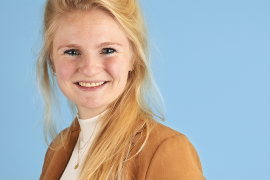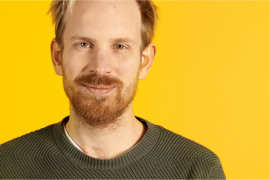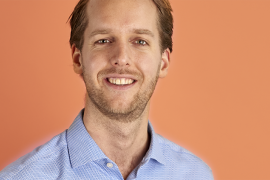Wardrobe activism with 10,000 people
The clothing industry is responsible for more carbon emissions than international aviation and maritime transport combined. The sector also consumes a massive amount of water; it takes 8,000 litres just to produce a single pair of jeans. Can we as individuals do anything to change this? Lena Hartog, climate activist and director of CollAction, is confident that we can, and she knows just how to do it. Through crowdacting, which involves taking action with a group of people all over the world.
Adopting a vegan diet for thirty days, not buying disposable plastic products for a month or making a six month commitment to spending less time looking at your phone – anyone can start their own crowdacting challenge on the CollAction platform. The idea is similar to crowdfunding, but instead of making a donation, you contribute by participating in the challenge.
Getting started with your own wardrobe
The Slow Fashion Movement – launched in part by Lena and her classmate Spencer Heijnen – began as a challenge and evolved into a global collective. In 2020, around 11,000 people participated in a fast fashion no-buy campaign for the entire summer. Why has this movement been so successful? According to Lena: ‘When you get started with your own wardrobe and you know that 10,000 others are doing the same thing, it feels like your actions really can change the world. We also give participants tools, such as videos and articles, to explain to those around them why they are participating. This puts their individual actions into a clear context. Ultimately, the collective is meant to be the first step towards long-term behavioural change in a large group of people.’

A different relationship with fashion
When Lena started the Slow Fashion Movement in 2020 based on CollAction’s annual Slow Fashion campaign, her education at University College Utrecht (UCU) came in handy. ‘My major was Psychology & Sociology, so I learned a lot about how to get people to change and how to draw attention to social issues. This allowed me to develop a certain cultural sensitivity. You might wonder what a concept like slow fashion has to do with culture. Quite a lot, actually. Every culture has a different relationship with fashion. In the Netherlands, for example, it’s very normal not to know where your clothes come from. Our ambassador in Sudan tells a completely different story. The fast fashion chains only arrived there 10 years ago, and it’s still much more common to make and mend your own clothing.’
‘This Changes Everything’
People don’t just become climate activists out of the blue. What was Lena’s inspiration? ‘My UCU classmate Mikki Korodimou. She recommended the book “This Changes Everything”. That opened my eyes and made me incredibly sad. Our actions have caused flooding in places where people have never even set foot in a Primark. But the book also gave me hope. The clock is ticking, but there’s still time. My dream is a just, sustainable world with an economy that works for all life on earth. To get there, we have to transition from overconsumption to an economy based on exchange, sharing, repairing and sustainable alternatives as soon as possible. I’m working towards this effort by building movements that combine behavioural change with political change. Politics are shaped by our behaviour, after all, so change will only happen when large groups of citizens revolt.’





